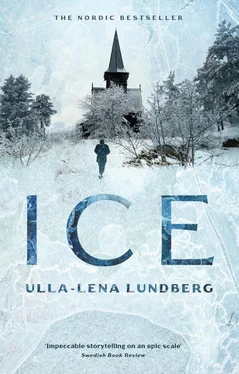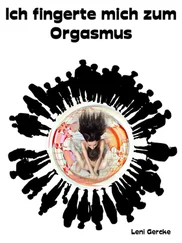In bits and pieces, the organist tells what they’ve arranged. “Brage is going to pick up the homecare sister early in the morning. I’ll call the priest in Mellom, who will certainly phone here. We’ll come back in the morning and carry him down. To the shed. What we’re going to do about everything—we’ll work that out tomorrow. But now you have to go to bed and get some sleep before your little girls wake up. The verger and Signe and I will stay here till Hanna comes.”
“No,” she protests. “Not at all! I’ll manage all right. You should all go home now.”
They look at each other. Brage stands up. “There’s nothing more I can do here. But my God if only we could make this not have happened!” He gathers up his clothes, which lie in a wet pile in the dining room. In the hall, his overcoat is still soaked, the priest’s sports jacket on a hanger looks pretty thin. He goes to the study and calls the Coast Guard, which can certainly come and pick him up in their light icebreaker after everything he’s done this night.
The organist follows him to the study. “I’ll ask the verger and Signe to sleep in here tonight. Someone needs to be here to answer the phone if people start calling first thing in the morning and Mona has managed to get to sleep.”
In the kitchen, the pastor’s wife doesn’t want to go to bed, and both the verger and his wife understand that she wants to sit where she is for the last few hours she has with her husband. Signe tiptoes into the bedroom and gets a pillow and a quilt. As she gives them to her, she gets such an utterly dismissive look—an unspoken “Go away!”— that she recoils and retreats to the study. When the others are out of sight, Mona lies down on the floor beside him and pulls the quilt over her. Seems to be asleep, not a sound when Signe looks into the kitchen timidly, turns down the lamp on the table, quietly withdraws. The organist leaves, Signe and the verger try to make themselves comfortable on the bed in the study, ready to jump up if the least little wheeze is heard from the phone. When Brage and the organist have gone, the house is deathly silent—a ghastly phrase!

Word goes out, in the morning by telegraph. The news has gone to the Åland Courier and to the correspondent for Hufvudstadsbladet in the capital and to the national radio. Now it’s a matter of getting word to everyone who needs to be told before the news goes public.
The priest in Mellom is speechless. He says. Although priests are talking machines and have something to say on every occasion, there is nothing he can say. He says. “Unbelievable, incomprehensible. It simply can’t be true. That’s all I can say. He was so young and strong, so full of life. Here today, gone tomorrow. As they say. No!”
“Yes,” the organist says. “I know that you were friends. As was I, a friend. We must contact the cathedral chapter. There are a lot of things to take care of, Sunday service, confirmation classes. But first the funeral. I think I speak for the widow if I say that we hope that you, his colleague and friend, will conduct the funeral service. But it would be good if you spoke to her yourself. The sooner, the better.”
“The widow,” says the Mellom priest. “Mona. It’s inconceivable. The little girls. Of course I’ll call. Thanks for letting me know. We need to stay in touch. We’re going to have to work together these next few weeks.”
“When you call, it would be a good idea to ask Mona if she wants you to call and give the sad news to his parents. I’m not sure, but I believe she isn’t on the best of terms with her mother-in-law.”
“Thanks. I won’t forget. But what will I say? What can you say?”
He is shaken. He is more shaken than he has been for a long time. Naturally he thinks of himself, of how suddenly things happen, of how the fact that you’re young and healthy and strong is no safeguard against death. But mostly, of course, he thinks of Petter, who has become his true friend during the three years they’ve been colleagues in the archipelago. Maybe his only friend, in the sense of being able to open up to someone, let down his guard, set aside his elegant irony. Even now he wants to call him to talk about this dreadful thing that has happened and its repercussions on his own working agenda, but now that possibility is closed. Now it is with fear and displeasure that asks to be connected to Örland Islands twelve, a number that for three years he has asked for with a smile on his lips.
It isn’t Mona who answers but the homecare aide. “Mrs Kummel is in the cow barn,” she reports.
“In the cow barn?” he says. He can’t believe his ears.
“Yes, she absolutely insisted. There’s no stopping her. The verger went with her. I’m staying inside with the girls.”
“I don’t understand. It’s incomprehensible.”
”That’s what we all think. Everyone is crying except Mrs Kummel. We’re worried about her. It would be good if you talked to her. Call back in half an hour.”
Behind Hanna’s collected voice lies an hour of horror. Fetched by the Coast Guard at seven that morning, she climbed the steps to the parsonage with dread in her heart. The pastor’s wife standing in the kitchen, the body lying by the stove, horribly dead. The verger and Signe in tears, Mona white around the nose, distant, but in some way still glad that Hanna has come. Hanna, who was with them through childbirth and illness, now also through a death. Mona tries to avoid her, but Hanna can’t help embracing her and saying, “There, there, dear heart.” She is utterly stiff and hard and struggles a little to get loose, takes a couple of steps backward—space, please. “Thank you for coming,” she says. “Now I can go to the cow barn, now that I know that you can take charge here.”
“But dear girl you can’t go milk the cows! I’ll go, or if you want me to stay here, Signe can go.” She looks at Signe, who nods eagerly, yes, of course, but Mona tosses her head in irritation. “No, I’ll go myself. Why shouldn’t I?”
Then they hear Sanna coming through the dining room, so big now that she can reach the door handle if she stands on her toes, and so strong she can pull it down and open it. The verger and Hanna form a wall in front of the stove. Sanna amazed.
“Good morning, darling,” says Mama. “Did you sleep well? Come, let’s go back to the bedroom. There’s something I have to tell you.” And so they walk away, just the two of them. No one else is invited. The bedroom door closes.
It doesn’t take long. No shriek is heard, or sobbing. What does she say? “Now, the bad news is that Papa is dead. He drowned last night. Fell through the ice. It’s going to take us a while to grasp the fact that he’s gone. Don’t be afraid. I’m here, and Lillus, and Aunt Hanna.” Maybe no more than that. And Sanna, curious and full of questions from dawn to dusk, does not make a sound. Asks no questions, for what do you ask? Just one question, “When is Papa coming home?” And the answer, that he’s not coming home, that he’s in heaven now, what can she say to that? It happens quietly and calmly, and then Mona is back in the kitchen.
“Hanna, maybe you could help Sanna get dressed and get Lillus up, while I see to the cows. And then we need to get some men who can carry …” Away the body, she means. They can’t have him lying there dead, scaring people. The kitchen is the natural gathering place in the morning, and how could they keep Sanna out for any length of time? She gets a sheet and spreads it over him, and the verger notices that the Coast Guardsmen are still there, standing in the lea of the cow barn, smoking. Brage too has thought about the body and wonders if they need help, so he’s in no hurry to leave. The verger asks them to fetch the sackcloth stretcher, which is rolled up in the sacristy in case someone should faint in the heat of the crowded church, and wait outside. There will have to be a shroud, but then it would be a big help if they could do the heavy lifting and carrying.
Читать дальше













